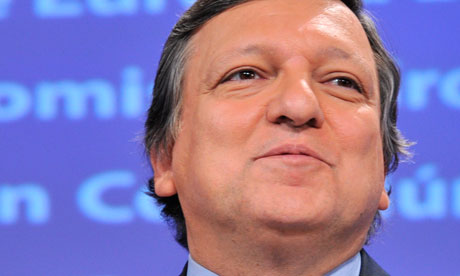A Robin Hood tax could turn the banks from villains to heroes
An EU-wide Robin Hood tax is close to becoming reality. Cameron must now tell the City to get on board

- guardian.co.uk, Wednesday 28 September 2011 20.30 BST
- Article history
 The European commission, led by president Jose Manuel Barroso, has backed proposals for an EU-wide Tobin tax. Photograph: Georges Gobet/AFP/Getty Images
The European commission, led by president Jose Manuel Barroso, has backed proposals for an EU-wide Tobin tax. Photograph: Georges Gobet/AFP/Getty ImagesIt's a script that even Hollywood might have balked at. In the midst of the worst economic crisis since the second world war, a small band of merry men and women hatch a plan to protect the poor by taking on the world's titans of finance and making them pay their fair share to society. In the final scene Goldman Sachs transforms into the good Samaritan, generating billions to tackle the world's problems.
Sound far-fetched? Not after the European commission formally brought forward proposals for an EU-wide tax on financial transactions involving shares, bonds and derivatives. The announcement – accompanied by comments from Algirdas Semeta, the tax commissioner, linking at least some of the proceeds to fighting poverty and climate change – is just the latest sign that the Robin Hood tax (also known as the "Tobin tax") is on the verge of becoming a reality.
Since our campaign – backed by 115 aid agencies, green campaigners, trade unions and faith groups – launched 18 months ago, public pressure to make finance work in the interests of society rather than the other way around has built steadily. The UK campaign alone has a quarter of a million supporters, and there are sister campaigns across the globe. A recent Eurobarometer poll of more than 27,000 people found that 61% of Europeans support a financial transaction tax (FTT), including 65% of Britons.
This pressure has taken time to translate into action. When I attended last year's G8 and G20 summits in Toronto (complete with green hat and bow and arrow) it was clear that while some countries were interested in the idea, progress had stalled amid a lack of political will and belligerent opposition from the Canadian hosts. There remained a feeling that this idea was a bit "out there", not entirely serious and potentially unworkable, at least without global agreement.
That has changed. One reason is that critics' arguments have been dismantled. It wouldn't work? No, it's perfectly feasible, according to the International Monetary Fund. It would be passed on to ordinary people? According to the IMF it would be paid predominantly by the richest. Does it have to be global to work? Not when the UK is one of a raft of countries that already have unilateral FTTs, including the US and China.
Faced by continuing global financial turmoil, Germany, France, Spain and a number of other European countries have also come out in favour. As the G20 chair, Nicolas Sarkozy's insistence that revenue should be used to help the poorest, the hungry and those hit by floods and other extreme weather episodes linked to climate change has been particularly important. Outside Europe, Brazil, South Africa and Argentina are supportive.
Earlier this year, more than a thousand economists – including Nobel prize winners – wrote to the G20 urging action. And just last week we heard that Bill Gates, founder of Microsoft and the world's second richest man, will recommend the FTT to the G20 as a way of raising much-needed funds for developing countries hit by the economic crisis.
Tens of millions of people have been pushed into extreme poverty by the economic crisis. Research for Oxfam suggests that 56 of the world's poorest countries face a $65bn (£41bn) hole in their budgets, forcing them to make cuts to healthcare and education that will cost and wreck lives.
There are still significant obstacles to a Robin Hood tax becoming a reality. As Europe and the rest of the world struggle to fight off the financial crisis mark II, constant pressure will be needed to ensure that revenues from an FTT go where they are most needed. Progress may also be limited or even derailed by the continuing opposition of a handful of countries, including the US, UK and the Netherlands, which continue to resolutely insist that the profits of banks and hedge funds must come first.
Unwilling to publicly admit opposition to such a popular measure, David Cameron's government is hiding behind two excuses. The first is risible. George Osborne has said repeatedly that while he is not against an FTT in principle, it must be global to work. Yet the UK's stamp duty on shares, introduced in 1694, is the largest such tax in the world with no noticeable effect on the City's status as a leading global financial centre.
Where the government has a point (and deserves real credit) is in arguing that, unlike other major nations, it remains on track to meet its aid promises to the poorest countries. Yet it has still not said how, in our age of austerity, it will meet the commitments it has made to help them cope with climate change.
And it is not just poor people abroad who need help. Earlier this year I visited a food bank in Putney, London, where I met British people relying on food donated by the public for a square meal. How can that be right while bankers pocket billions in bonuses?
If Cameron wants to show that we really are all in this together, he needs to tell the City it is time they paid their fair share, and extend Europe's plans to tax derivatives and bonds as well as shares. Bankers' bonuses replaced by billions to help the poor. Now that really would be a happy ending of which any film-maker could be proud.
Thursday, 29 September 2011
A Robin Hood tax could turn the banks from villains to heroes | Bill Nighy | Comment is free | The Guardian
via guardian.co.uk